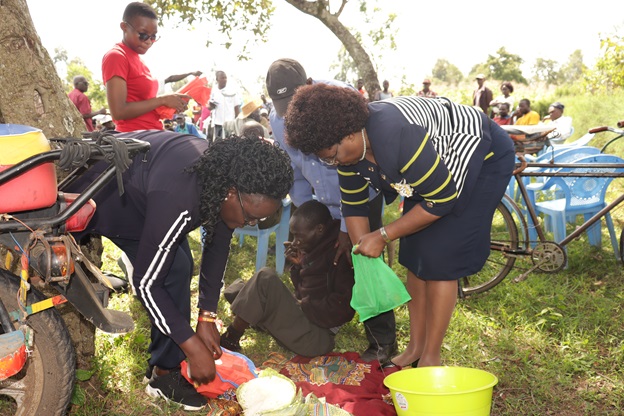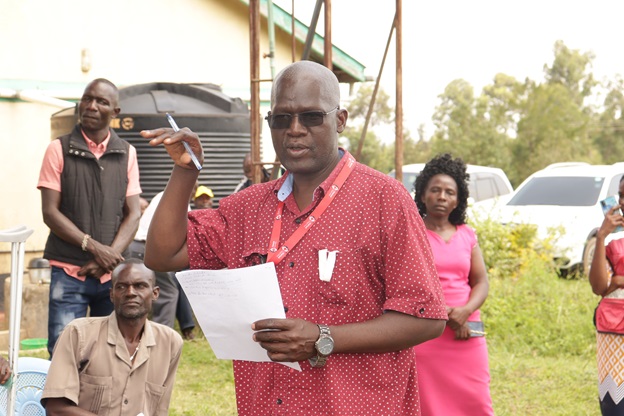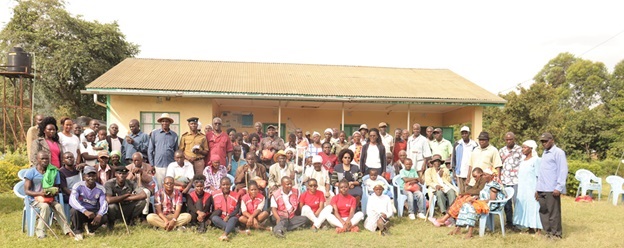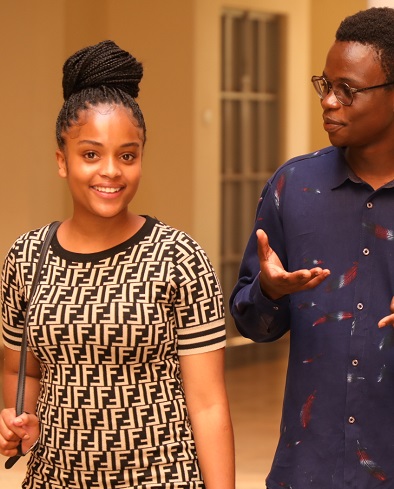The SDMHA is mandated to teach, undertake research and engage in outreach whose activities are centered in response to the less privileged in society. In order to alleviate human suffering in the region, the School has previously provided humanitarian assistance to the old and poor in a number of areas in Western region including Budalangi, Bokoli and Shinyalu. However, Manda-Shivanga was no different as it hosts a population of over 500 registered PLWD among them the old and poor. Preceded by its reputation, the School was approached for support by the Manda-Shivanga ward Member of County Assembly (MCA), Hon. Jacob Luvusia Chivolo, who is also living with disability.

Prof. Josephine Ngaira and Ms. Betty Opilo give donations to one of the beneficiaries during the outreach.
This led to the birth of the outreach, which attracted a total of 130 participants out of which 91 were PLWD from the originally targeted 94 from the seven Sub locations. Speaking during the event, Prof. Ngaira who is a Senior Professor at the SDMHA and the leader of the initiative, urged participants to be each other’s keepers. “Just because you are sick and disabled, do not think that you are the forgotten ones. God has a purpose for each of you, so endeavor to smile because you are who you are. For us who are abled and blessed to have something, let us have a heart of giving, for it is in giving that we will receive more blessings. Let us be each other’s keepers!” said Prof. Ngaira.
Dr. Nabiswa highlighted the University’s mandate saying that it is grounded in generation of knowledge, research as well as community outreach. “Today, we are not only partnering with the Red Cross but also implementing the mission of our University by undertaking humanitarian initiatives to alleviate human suffering,” he stated.
Further, he pointed out that learning in the SDMHA is carried out in the field and not in the confines of the classroom. He added that such opportunities give the students practical exposure regarding what to expect out there.

Dr. Ferdinand Nabiswa explains a point at the outreach.
The medical officers who comprised of a clinician and nutritionist from the University clinic had the opportunity to attend to the sick and referred those who could not be treated on the ground to other hospitals for further evaluation. Notably, Ms. Ednah Sabiri, an expert from the department of Health Promotion and Sports Science had the chance to chat with the participants. She emphasized on the fact that people with Disabilities need to be active to enhance physical, social and mental health. Additionally, she noted that exercise is a great tool for enhancing socialization as well as stress management besides being the cheapest means of managing health.
It was notable that for many people living with disability and those who care for them, daily life is not always easy and that disabilities affect the entire family. The Chairman of the disabled, Mr. Hailam Nyamu appreciated the initiative from the University. He applauded the University through the SDMHA team represented on the ground for helping individuals in his community find hope.
Other notable personalities present during the event were the Manda-Shivanga ward Member of County assembly (MCA), Hon. Jacob Luvusia Chirolo, Assistant Chief Tombo location, Mr. Philip Ngome, Clerical Officer at Webuye Campus, Ms. Edith Kundu, Senior Technical Officer, SDMHA, Ms. Betty Opilo, Mr. Leonard Nyongesa and Mr. Otsianda Peter from SDMHA.

MMUST team with community members.
Today, we continue to live in communities where stigma around people with disabilities is very real. We still witness stereotypes around families of persons with disabilities, often intertwined with traditional beliefs and this has brought about suffering caused by rejection from the community. The World Health organization estimates that about 15% of the world’s population has a disability. We cannot condemn all these people to misery and hopelessness. Instead, we should embark on creating conditions in which PLWD do not suffer discrimination but instead participate in decisions that affect them. Humanitarian intervention outreach is one way of resolving this.
Story by Caren Nekesa
Photos by Gabriel Juma




